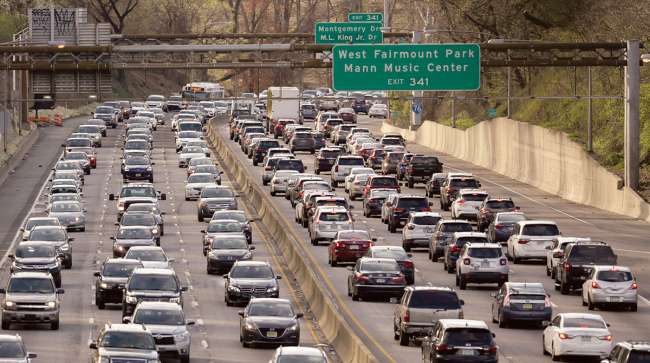Staff Reporter
Miles-Based User Fee Among Options Outlined in Pa. Report

[Stay on top of transportation news: Get TTNews in your inbox.]
A recent report from Pennsylvania’s Transportation Revenue Options Commission shows a mileage-based user fee could serve as a viable option for long-term transportation funding.
The commission was created by Gov. Tom Wolf in March and is composed of transportation, energy and community representatives.
The Final Report and Strategic Funding Proposal presents a mix of revenue sources that is meant to address funding shortfalls in the near and long term.
The report proposes a mileage-based user fee (MBUF) of 8.1 cents per mile on all miles traveled in Pennsylvania.

Oyler
Pennsylvania Motor Truck Association President Rebecca Oyler said this figure would, for the average truck, represent a significant reduction from what the trucking industry currently pays in state diesel tax revenue. Pennsylvania’s fuel tax rates are 74.1 cents per gallon for undyed diesel and 57.6 cents per gallon for motor gasoline, according to the Pennsylvania Department of Revenue.
The report acknowledges that an MBUF system would likely be a long-term solution, noting its success depends on coordination with neighboring states.
“PMTA is not opposed to the idea of a fair and equitable MBUF in the long-term future,” said Oyler, a member of the Transportation Revenue Options Commission. “However, there are many issues that need to be addressed over the coming years before MBUF is proven a cost-effective and efficient way to collect transportation taxes.”
TROC Final Report by Transport Topics on Scribd
Such issues include questions over how the fees are collected, who administers them and how the system accounts for interstate travel, according to Oyler.
As a medium-term option, the report identifies corridor tolling and managed lanes as possible funding sources. The state’s truck and bus industry representatives have expressed concern that tolling could result in vehicle diversion to routes intended for lower volumes of traffic.
New or increased fees, such as those associated with vehicle registrations or electric vehicles, were identified in the report as funding techniques that can work immediately and in the future.

What's next for data gathering and analytics programs in trucking? Host Seth Clevenger speaks with Andrew Johnson of PrePass Safety Alliance and Chris Orban of Trimble Transportation. Hear a snippet above, and get the full program by going to RoadSigns.TTNews.com.
Oyler expressed concern over the potential for a slew of tax and fee increases combined with the high administrative costs of an MBUF, which she said could result in cumulative cost increases for trucking firms.
“If the outstanding questions with MBUF can be addressed over the long term, it should be considered as a component of the overall tax structure for transportation funding,” Oyler said. “Layering it on top of many other transportation taxes and fees users already pay will have unintended consequences and certainly won’t help the trucking industry in Pennsylvania compete on a level playing field.”
Pennsylvania, which is home to a large and old infrastructure system, faces a transportation funding shortfall. The report indicates the Pennsylvania Department of Transportation’s annual budget of $8.8 billion would need to more than double to $18.15 billion to address the state’s transportation system needs.

Gramian
“Inaction is not an option,” said PennDOT Secretary Yassmin Gramian, who served as chair of the Transportation Revenue Options Commission. “The commonwealth must modernize and restructure its approach to transportation funding for the long term, while rapidly adopting near- and medium-term changes. Ultimately, future implementation of MBUF fully aligns revenues with identified needs.”
The commission convened virtually nine times over five months to develop the solutions outlined in the report.
In terms of next steps, the report recommends the establishment of leadership and technical teams within the next six months to support the Pennsylvania General Assembly and the Wolf administration in proposal implementation.
Want more news? Listen to today's daily briefing below or go here for more info:



